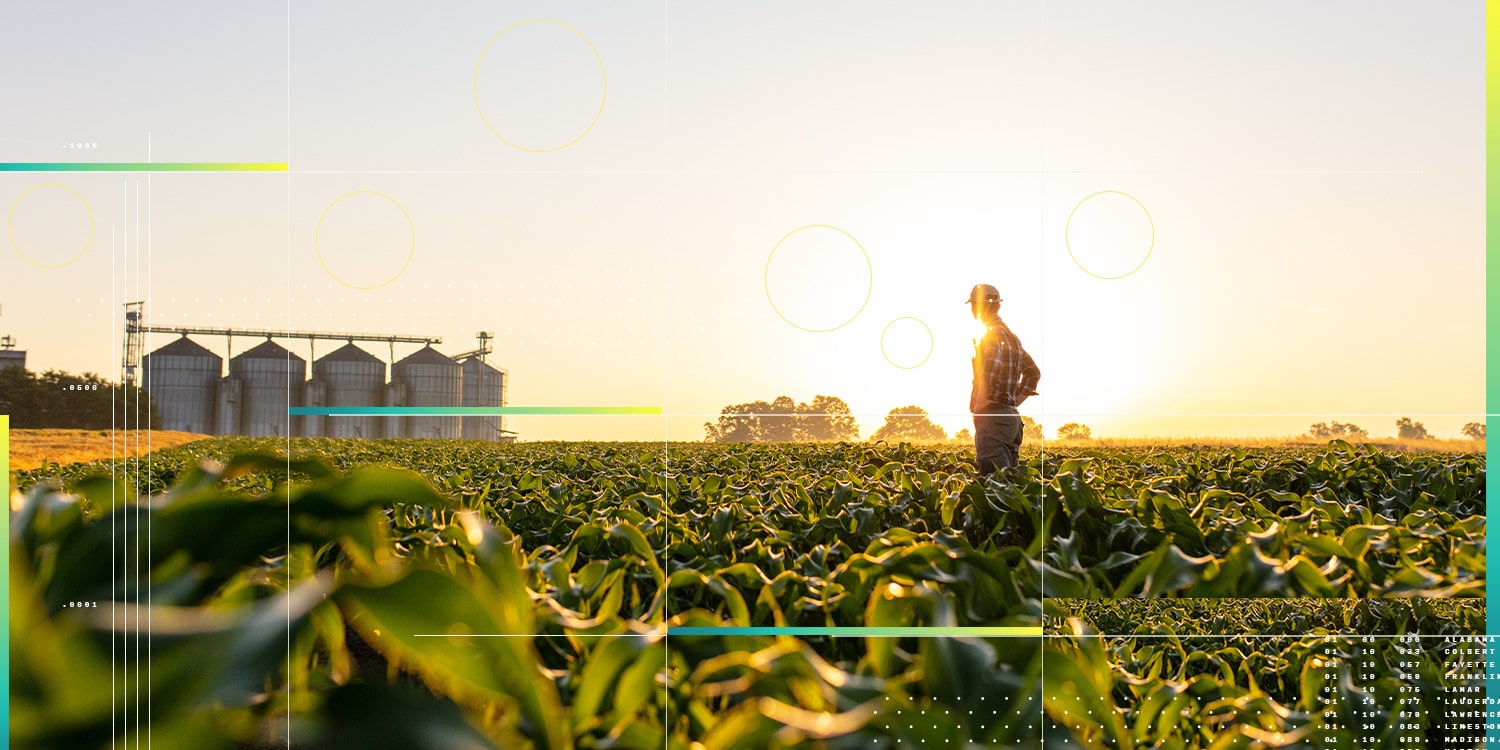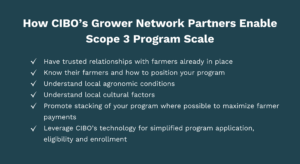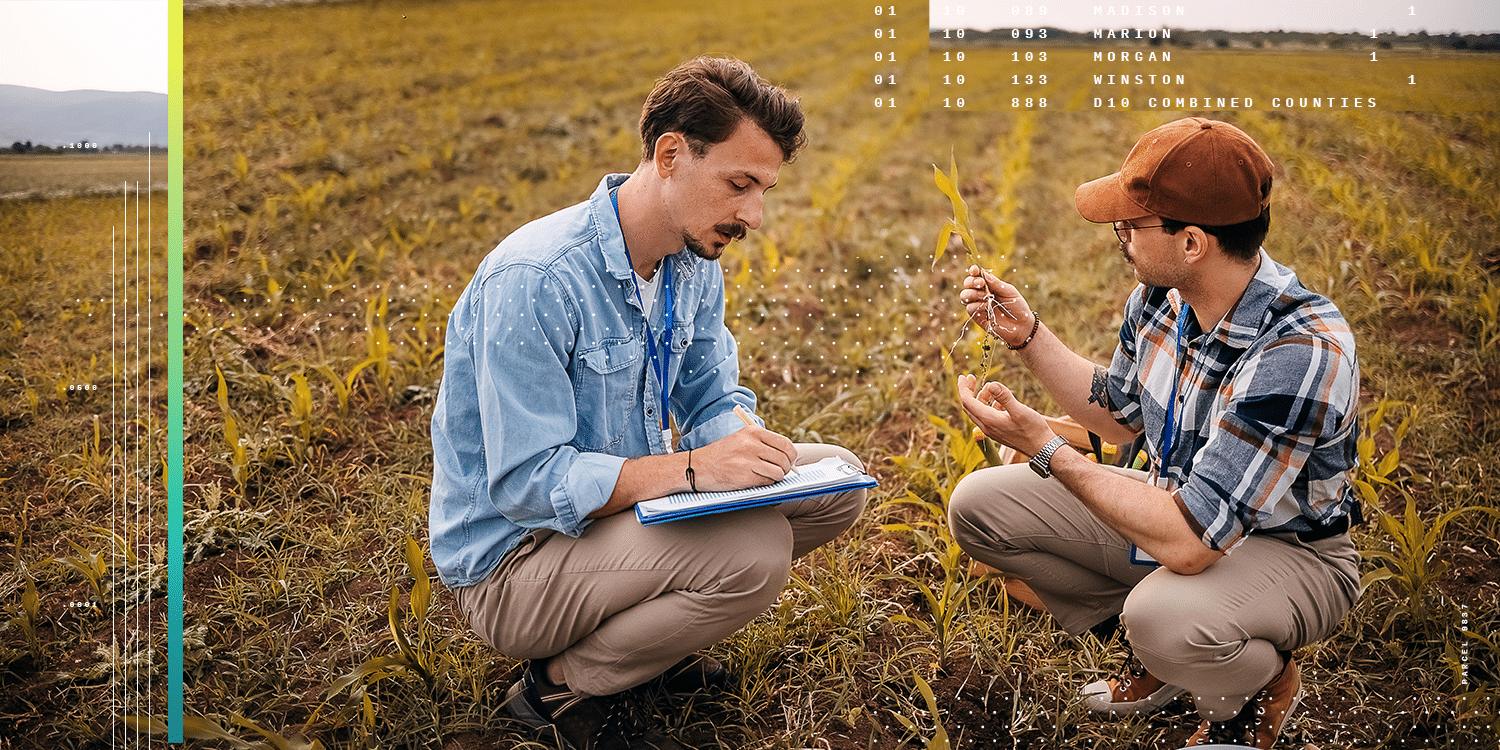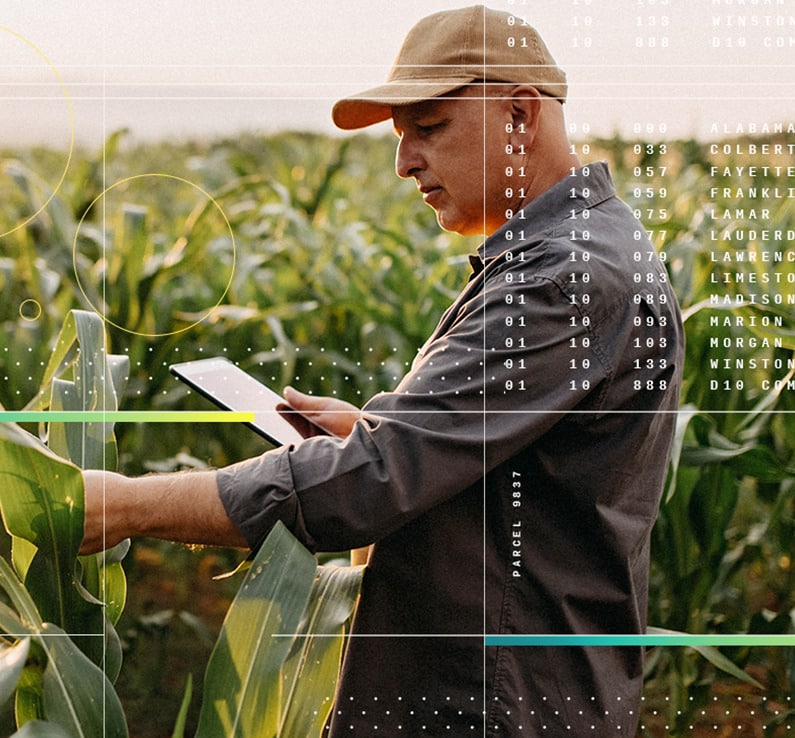Boots on the Ground: Accelerating Regenerative Agriculture Program Adoption with CIBO’s Software-Enabled Trusted Advisor Network
Leveraging Technology and Trusted Farmer Relationships for Scaling Scope 3 Programs in Agriculture
In the past decade, companies have boldly committed to reducing carbon emissions in their agricultural supply chains, naming regenerative agriculture as a potential solution. In total, across the top 100 CPG companies, 40.5M acres and >$3.2B of investment are committed under a regenerative agriculture target. With only seven chances for farms to adopt regenerative agriculture between now and 2030, the first official checkpoint for many companies is fast approaching. To reach their emissions reductions targets, companies need more farmers to adopt regenerative practices than ever before and at unprecedented rates. Numerous pilot programs that pay farmers to transition to regenerative agriculture are underway to drive adoption, with agricultural companies acting as “program sponsors” who pay farmers in exchange for adopting practices that have potential to reduce agricultural emissions. Yet, with public SBTi commitments looming ahead, program sponsors face a crucial question: How can we scale the adoption of regenerative practices, beyond these pilot programs?
To aid in the transition to regenerative agriculture, the United States Department of Agriculture (USDA) is funneling billions of dollars into “climate-smart farming” through key conservation programs such as Climate-Smart Commodities, the Regional Conservation Partnership Program (RCPP), and the Environmental Quality Incentives Program (EQIP). Companies themselves are investing tens of millions of dollars into incentivizing farmers. But despite the increased funding available to farms for regenerative transitions, the adoption of cover crops (a key regenerative practice) is slowing down.
Scaling the adoption of regenerative agriculture isn’t only a matter of increasing incentives to farmers. There is a range of barriers cited by McKinsey and other industry publications; barriers include operational challenges, lack of trusted agronomic advice to guide decisions, on-farm infrastructure or equipment costs/modifications, concern about the risk of yield, and so on. Each of these barriers come with a cost. If farmers are not sufficiently supported to overcome these hurdles, along with appropriate compensation, it’s simply not worth it to them to transition.
In the face of such challenges, farmers respond to trusted technical advice that is paired with financial incentives. With this understanding in mind, CIBO Technologies developed a systems approach to designing, deploying, and delivering Scope 3, Low Carbon Intensity, and public/private programs through our Trusted Advisor Network.
With 2030 goals fast approaching, Scope 3 Programs don’t have time to move at the pace of building trust one-by-one. CIBO’s advisors already have trusted farm relationships in key supply regions. CIBO enables these trusted advisors with a technology platform to offer farmers access to your sustainability programs. Through CIBO’s integrated approach, companies can deliver emissions reductions, improve soil health, and create resilience in their supply chains.
With 2030 goals fast approaching, Scope 3 Programs don’t have time to move at the pace of building trust one-by-one. CIBO’s Trusted Advisor Network already has trusted farm relationships in key supply regions. CIBO enables these partners with a technology platform to offer farmers access to your sustainability programs.

Aligning trusted technical advice with financial incentives requires meeting farmers where they are. To create this alignment, CIBO develops partnerships with cooperatives, agronomists, and other farmer-facing organizations, then equips these partners with a purpose-built technology platform to deploy sustainability programs. By working with CIBO’s advisor network, Scope 3 and sustainability program sponsors can leverage trusted, agronomic relationships already in place across key supply sheds, setting the foundation for successful deployment of sustainability programs.
CIBO’s tech-enabled Trusted Advisor Network helps identify ideal regions within companies’ supply sheds where intervention programs can deliver the most impact, then source acres and farmers for their programs using their unique cultural and agronomic understanding of the regions. CIBO Impact is the technology backbone of their on-field efforts; while our advisors are hitting the fields recruiting farmers, CIBO Impact organizes, streamlines, and accelerates all enrollment, measurement, and reporting activities with minimal input from the farmer. CIBO Impact tracks and quantifies program participation through the growing season and across the lifespan of the program, reporting annually on results from your program design to meet all the highest GHGP and SBTi standards. Together, the Trusted Advisor Network and CIBO offer a systems approach to enroll farmers in sustainability programs; our end-to-end solution goes beyond basic measuring, reporting, and verification (MRV) capabilities, and positions CIBO as the only Scope 3 Program solution designed to scale regenerative agriculture adoption.


Adoption of key regenerative agriculture practices is not only too slow to meet 2030 targets, it’s actually slowing down in key geographies. According to U.S. Ag Census data, 17.9 million acres were farmed with cover crops in 2022, amounting to 4.7% of farm acres in the US. The percentage climbs as high as over 15% in some counties in the Midwest. However, even though the number of cover cropped acres is increasing, the rate of adoption is decelerating, and the number of no-till acres is declining in some regions. These numbers suggest that regenerative farming is still solidly stuck in the early adopters phase, far from being considered a mainstream operating system. Sustainability efforts must address the barriers preventing farmers from transitioning in order to speed up adoption to the rate needed to reach sustainable business targets; such barriers fall under three categories: cost, culture, and confusion.

The short term cost of transition remains the top barrier farmers cite. According to the Environmental Defense Fund, the direct costs of cover cropping alone ranges between $14/acre to $310/acre, varying across crops and geographies. Many studies reveal that these costs are transitory, and actually benefit farm profitability in the long-run. For example, BCG reports that the return on investment for farmers adopting certain regenerative practices is between 15-25%, outperforming the profitability of conventional production.
Conducting a multi-year profitability calculation leaves out a large swath of target farmers: renters. Framing the cost to farmers operating on rented land as solely an investment over a transitory period doesn’t work for farms who can’t afford to lose money within one year’s cycle. A third generation Midwest Iowa Farmer with over 3,000 acres, owned and operated, confirmed this reality, citing that, “The average farm has too much rented ground and borrows too much money not to be profitable every year.” Even the farmers who own their land consider the cost of “sustainable practices” to remain higher after they transition; McKinsey respondents reported that farmers expect costs of sustainable production to remain higher than conventional, despite evidence that the cost of inputs such as fertilizer will decrease over time.
In order to overcome the cost barrier, farmers must have the option to engage in a program or a set of programs that will pay enough each year to offset the cost of transition until they can realize the ROI savings. Possible solutions such as public and private program stacking, regenerative financing, and higher incentive payments for practice are all potential sources. However, navigating such sources remains a challenge, and the ability to bring all these possibilities together is critical. CIBO Impact was created to identify and prequalify all program options available to each farmer every year, helping to create more optionality for farms’ individual financing needs. When multiple public and private programs are offered as a suite of options to farmers through CIBO Impact, farmers can maximize incentive potential.
Beyond costs, Some resistance derives from the predominant culture of conventional agriculture. For example, one farmer reported to the Sustainable Food Lab in 2023 that the transition to regenerative could be alienating: “Plant a cover crop in the middle of an area of conventional agriculture and you will be diminished in the eyes of your neighbors.” Similarly, BCG cites peer pressure as one of the three primary barriers to adopting regenerative practices, as conventional practices are the cultural norm.
Overcoming the effects of peer pressure is rarely done through an outsider’s actions; conventional wisdom shows us that change happens within trusted relationships. The Scale Lab reports that hesitance to adopt regenerative practices can be overcome if a farmer’s “choices fit an evolving culture shaped by neighbors, advisors, personal networks, and media messages.” When farmers have more options for public and private incentives coupled with training, advice, and support, the scale and pace of regenerative practice adoption increases. Trusted farm advisors play a critical role in this cultural shift. As agronomically and culturally relevant partners, advisors can help tailor messaging to focus on the key opportunities and on-farm benefits to be realized through regenerative agriculture. Their ability to share success stories of other farms in the region, as well as work through challenging setbacks, can help farms see beyond status quo resistance as they navigate their decisions. CIBO’s Trusted Advisor Network approach was designed around the importance of trusted relationships; sustainability programs that leverage the expertise and geographic relevance of our partners can help change the culture of conventional agriculture.
When farmers have more options for public and private incentives coupled with training, advice, and support, the scale and pace of regenerative practice adoption increases.
Additional resistance is related to the evolving nature of regenerative ag programs and their various options for farmers. Many farmers are aware of regenerative practices themselves, but don’t understand what programs are available or how to navigate between them when adopting new practices. McKinsey reported that 34% of medium and large farms (those operating over 1,000 acres) cited that their understanding of sustainability programs, such as USDA’s EQIP and carbon programs, is a top barrier to regenerative adoption. Without advisors to navigate these tricky questions of adoption, financing, and agronomy, farmers continue to wait on regenerative practice adoption.
Take USDA’s EQIP program, for example. While many farms are aware of this program, they may struggle to find information clarifying what practices and resource concerns will qualify them for funding. Clear and quick communication of program requirements and financial benefits is crucial, and the CIBO Impact platform delivers exactly this information through our recommendations engine and shared through conversation by a Trusted Advisor Network member. Farmers can see, at a glance, practice recommendations to address EQIP resource concerns, as well as the potential revenue they could make if they enroll in and complete a program.
When exploring enrollment in additional programs beyond EQIP, it can become even more challenging to navigate. For example, if a CPG company wants to deploy a commercial program to the same grower community enrolling in EQIP, farmers struggle to navigate the overlapping nature of these programs. Farmers look at programs and ask questions like – “Can I enroll in this commercial program if I’m already enrolled in EQIP? Are these incentives stackable? What other options do I have?” CIBO Impact was designed to answer these questions, providing guidance through various scenarios. Beyond the Trusted Advisor Network, farmers can also connect their own agronomists and advisors to the CIBO Impact platform so that their other advisors can advocate for the best outcomes, armed by CIBO’s insights on each program.
CIBO Impact provides a solution that not only streamlines the program application process, but also increases the likelihood of a farmer receiving incentive funding for regenerative practices. CIBO Impact’s platform powers our trusted advisors with critical information on public and private conservation programs so that farmers can gain access to these programs and make empowered decisions about participation.

Understanding that costs, culture, and confusion around navigating sustainability programs are the key barriers to regenerative adoption helps inform successful Scope 3 program design. By combining trusted technical advice with appropriate financial incentives, companies can support farms in overcoming hurdles to transition to regenerative ag. CIBO developed our Trusted Advisor Network with these two key functions in mind, building a systems approach to help companies better target their engagement of farmers and drive higher, faster enrollment rates while measuring the impact with high integrity. Through our Trusted Advisor Network, CIBO provides boots-on-the-ground access to growers across multiple supply sheds in the Midwest and across the U.S.

Through our Trusted Advisor Network, CIBO provides boots-on-the-ground access to growers across multiple supply sheds in the Midwest and across the U.S.
To get the message of “regenerative ag” to the right audience of farmers, you need the right messenger. CIBO creates partnerships with our Trusted Advisor Network that serve as these messengers; these partners are already in the field giving farmers agronomic advice, embedded in your supply sheds. As trusted advisors, they have strong reputational positioning. They are ag retailers, co-ops, and agronomists who understand the cultural and agronomic landscape. In some cases, NGOs also play the role of “trusted advisor,” providing farmers with the holistic resources needed to transition their operations to regenerative agriculture.
The trust between our advisors and farmers comes from the long-standing relationships mentioned above, as well as the geographic relevance advisors have to the agronomic and cultural conditions. With 2030 goals fast approaching, Scope 3 Programs don’t have time to move at the pace of building trust one-by-one. Instead, CIBO connects you with advisors who already have trusted farm relationships; together, we enable these trusted advisors with a technology platform to offer farmers access to programs. The Trusted Advisor Network syndicates, deploys, and manages all types of sustainable agriculture programs backed by diverse program sponsors across their acres.
CIBO selects partners who can deliver low-carbon sourcing with the scale and reliability companies need. As of late 2024, CIBO has developed an extensive network stretching across the farm belt in key supply shed regions. By offering access to trusted advisors in key geographies who are capable of rapidly deploying programs across hundreds of thousands of acres, CIBO provides a turnkey solution for companies looking to expand beyond their pilots into full scale programs.
CIBO’s Trusted Advisor Network can help private program sponsors, such as a food company syndicating a nutrient management program to one of their supply sheds, define program strategy and positioning for their sustainability programs. Our partners’ involvement in the design and deployment build confidence for emissions reduction initiatives due to their ability to understand and relate to key demographics of farmers. CIBO supports Scope 3 and other program success by facilitating learning between sponsors and trusted advisors on crucial factors, such as program sizing and practice selection, to drive successful enrollment. For example, a Trusted Advisor Network member in northern Iowa may inform a program sponsor that their no-till program may not be an agronomic fit for the region, and instead recommend a low-till alternative. Incorporating agronomic and cultural insights into the design of intervention programs upfront can increase the likelihood of higher enrollment rates and overall successful deployment.
Partnerships with advisors are a key component of CIBO’s systems approach to designing, deploying, and delivering Scope 3 reductions. Companies can leverage the trust and positioning of our network to overcome the challenges of farmer enrollment and scale sustainability programs.
By offering access to trusted advisors in key geographies who are capable of rapidly deploying programs across hundreds of thousands of acres, CIBO provides a turnkey solution for companies looking to expand beyond their pilots into full scale programs.

Even with a trusted advisor in place, a sustainability program’s success still hinges on appropriately compensating farmers for their transition to regenerative practices. Depending on the type of on-farm interventions, the funding required can exceed the funds available internally at a single company. On the other hand, public USDA programs are a key component of incentivizing farmers to adopt sustainable practices, but they can be challenging to navigate. Stacking private funding on top of public USDA programs is critical to incentivizing a farmer’s transition to regenerative agriculture, but there is no single easy source for finding and qualifying for public and private programs simultaneously. CIBO has built this capability through the CIBO Impact solution, which our Trusted Advisor Network uses to prequalify and enroll farmers for conservation programs.
While privately funded sustainability programs are a key lever in reducing agricultural emissions, these private programs are still a relatively new option for many farms who may be more accustomed to USDA programs. McKinsey’s recent survey revealed that government programs have greater participation rates compared to industry programs; 57 percent of farm respondents claimed involvement in a government program, while only 4 percent participated in an industry-sponsored program. Despite relatively lower participation rates, CIBO’s Trusted Advisor Network members have shared anecdotally that interest in industry programs amongst farmers is strong. The interest in programs is met with confusion; McKinsey reported that while there is interest in private incentive programs, farmers lack understanding of how to choose the best option(s) amongst them. To capitalize on the interest in private programs, program sponsors need to ensure that farmers have support as they navigate across the public and private multiple programs. When farmers are able to enroll in multiple programs, they can maximize the incentives available to them in order to adopt regenerative practices.
During the process of navigating program enrollment, trusted advisors serve as a farmer’s vital trusted resource. Using CIBO Impact, our network can share program opportunities appropriately to farms while also serving as the farmer’s advocate to select the right programs for their farm. It can’t be just anyone sitting at the table with the farmer – trusted advisors have deep knowledge of public conservation programs, and by knowing the pros and cons of these programs, they can help introduce it as an option in context of broader access to incentives. USDA’s EQIP program, for example, is a chance for farmers to earn upwards of $60 per acre for certain conservation practices. EQIP can be presented by our Trusted Advisor Network in the context of a farm management plan; this means your Scope 3 industry program can be presented alongside EQIP funding, maximizing the financial opportunity for growers. Agronomically relevant advice can help farmers understand how these program options fit into their crop plans, and the trusted partner is a critical advisor in this conversation.
CIBO Impact’s platform was designed to complement the agronomic advisor’s role by providing a solution that not only streamlines the application process, but also increases the likelihood of a farmer receiving incentive funding for regenerative practices. For example, using our platform, advisors can use CIBO’ Impact’s recommendation engine to help farmers identify field-level resource concerns from grower-provided and spatial data, and match these to practices prioritized by the USDA. CIBO’s algorithms can also alert growers to new practices that are the best fit for their fields and prioritized by their state to increase odds of application acceptance, as well as generate a field-level plan with selected practices for the grower to present to the NRCS. Together, the CIBO Impact solution is built to help farmers navigate the evolving space of public and private programs, with trusted advisors playing a critical role in providing trusted advice and advocacy through the enrollment and decision-making process.

Given the cost, cultural, and confusion-related challenges facing farmers, getting a Scope 3 program started might seem daunting. CIBO’s Trusted Advisor Network can jumpstart your Scope 3 emissions reduction progress by providing trustworthy and relevant access to farmers and acres in key supply sheds.
CIBO recommends companies begin by identifying your supply shed to get your Scope 3 initiatives on track. CIBO baselines specific Carbon Intensity sources across your supply shed, and can work with you to find the right trusted advisor that represent agronomy expertise and geographical relevance to advance your sustainability goals.
CIBO’s technology platform CIBO Impact is the end-to-end solution that enables our Trusted Advisor Network to offer multiple public programs alongside your private offerings, maximizing the financial incentive for farmers in your supply sheds. The agronomic advice offered by advisors to farmers helps them evaluate their options, while CIBO’s Impact solution brings diverse programs such as EQIP and your private programs into one dashboard for ease of enrollment and measurement.
CIBO’s Scope 3 reporting utilizes an inventory accounting approach for annual row-crop production. CIBO’s carbon intensity, also known as emission factor (EF), approach is not credit based and enables the direct integration of program and supply shed level EFs into GHG inventories and life cycle assessments. We believe this GHG accounting framework is best aligned with the Draft GHGP LSRG and SBTi FLAG standards and can help enable landscape-level change.
Contact CIBO at info@cibotechnologies.com today to discuss your intervention program approach and explore how CIBO’s Trusted Advisor Network can scale your Scope 3 efforts.

Key Sources:
“Summary: Regenerative Ag CPG Targets.” CREO, May 2024.
Sustainable Food Lab. Scale Lab 2023: Will regenerative agriculture be the new normal?, 2023. https://sustainablefoodlab.org/wp-content/uploads/2023/09/Scale-Lab-Report-2023-091823-.pdf.
Aizenberg, Alexander, and Francois Luu. Nearly All Companies Will Miss Net Zero Goals Without At Least Doubling Rate of Carbon Emissions Reductions by 2030, Accenture Report Finds, November 1, 2022. https://newsroom.accenture.com/news/2022/nearly-all-companies-will-miss-net-zero-goals-without-at-least-doubling-rate-of-carbon-emissions-reductions-by-2030-accenture-report-finds.
“2022 Census of Agriculture: Cover Crop Use Continues to Be Most Common in Eastern United States.” USDA ERS – Chart Detail, April 16, 2024. https://www.ers.usda.gov/data-products/chart-gallery/gallery/chart-detail/?chartId=108950#:~:text=U.S.%20cropland%20area%20planted%20to,of%20total%20cropland%20in%202022.
Plastina, Alejandro, Wendiam Sawadgo, and Emmanuel Okonkwo. “Cover Crop Adoption Decelerates and No-till Area Stagnates in the I-States.” Agricultural Policy Review, n.d. https://agpolicyreview.card.iastate.edu/winter-2024/cover-crop-adoption-decelerates-and-no-till-area-stagnates-i-states.
Gustafson, David I. “Cover Crop Adoption Slows According to Data.” Progressive Farmer, April 18, 2024. https://www.dtnpf.com/agriculture/web/ag/news/article/2024/04/17/real-time-data-needed-better-track-2.
Fiocco, David, Vasanth Ganesan, Maria Garcia de la Serrana Lozano, Julia Kalanik, and Wilson Roen. Voice of the US farmer 2023–24: Farmers seek path to scale sustainably, April 9, 2024. https://www.mckinsey.com/industries/agriculture/our-insights/voice-of-the-us-farmer-2023-to-24-farmers-seek-path-to-scale-sustainably?cid=soc-web.
LaCanne, Claire E, and Jonathan G Lundgren. “Regenerative Agriculture: Merging Farming and Natural Resource Conservation Profitably.” PeerJ, February 26, 2018. https://www.ncbi.nlm.nih.gov/pmc/articles/PMC5831153/.
Bugas, Jack, Helena Conant, Sonya Hoo, Francesco Bellino, Shalini Unnikrishnan, and Matt Westerlund. “Making Regenerative Agriculture Profitable for Us Farmers.” Climate Change and Sustainability, August 15, 2023. https://www.bcg.com/publications/2023/regenerative-agriculture-profitability-us-farmers.
Milinchuk, Artem. “Council Post: Is Regenerative Agriculture Profitable?” Forbes, February 4, 2020. https://www.forbes.com/sites/forbesfinancecouncil/2020/01/30/is-regenerative-agriculture-profitable/?sh=2439d601cdf2.
Aizenberg, Alexander, and Francois Luu. Nearly All Companies Will Miss Net Zero Goals Without At Least Doubling Rate of Carbon Emissions Reductions by 2030, Accenture Report Finds, November 1, 2022. https://newsroom.accenture.com/news/2022/nearly-all-companies-will-miss-net-zero-goals-without-at-least-doubling-rate-of-carbon-emissions-reductions-by-2030-accenture-report-finds.
Van Nurden, Pauline, Katherine Wilts Johnson, and Devin Brand. The Economics of Cover Crops on Minnesota Farms, 2022. https://www.edf.org/sites/default/files/2023-07/Economics of Cover Crops on MN Farms Report 2022.pdf.
Plastina, Alejandro, Wendiam Sawadgo, and Emmanuel Okonkwo. “Cover Crop Adoption Decelerates and No-till Area Stagnates in the I-States.” Agricultural Policy Review, March 26, 2024. https://agpolicyreview.card.iastate.edu/winter-2024/cover-crop-adoption-decelerates-and-no-till-area-stagnates-i-states.